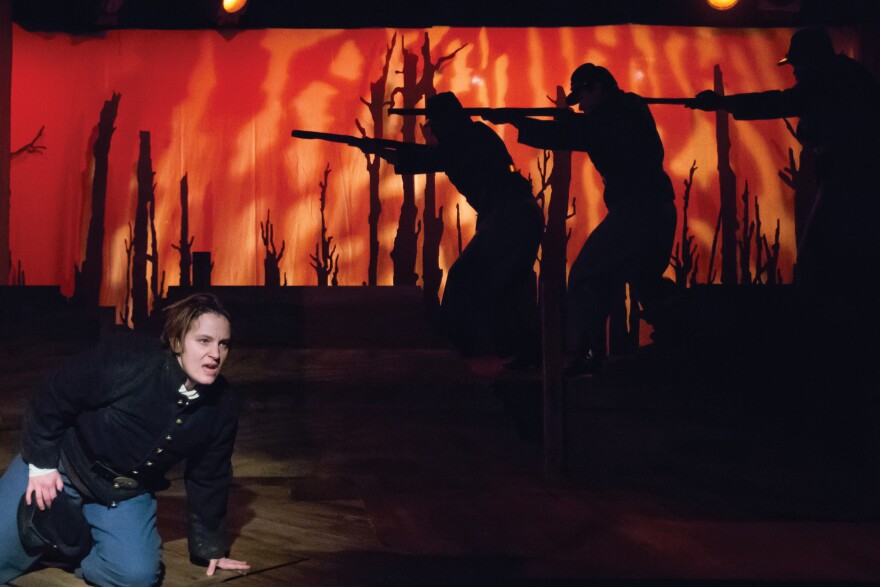Say a woman wants to serve in the United States Army. No problem, right? Women are eligible. But, dial it back 160 years to the Civil War, and consider that women couldn’t just pop into a recruiting station and sign up.
"We know that about 250 (women) were documented as fighting in the U.S. Army, but those are only the ones who were discovered. Historians think it's over 2,000 women," says Boston playwright Wendy Lement.
The Coterie Theatre has brought Lement's play, "Secret Soldiers: Heroines in Disguise," to Kansas City. Lement calls it an "interactive theater in education piece."
At issue is gender equality in historical records, in availability of opportunity and in pay. The play puts the longevity of these topics into perspective, at least as far as military service is concerned.
It wasn't until 2013 that the Secretary of Defense rescinded the Direct Combat Exclusion Rule which kept women from serving in combat arms roles, but full integration is still incomplete. And on Tuesday, the U.S. Supreme Court let President Donald Trump’s ban on transgender people in the armed forces take effect while the legal battle for a final decision continues in court, even though each of the four service chiefs has stated that transgender servicemembers do not disturb unit readiness.

Suitable for grades five and up, "Secret Soldiers" tells the true stories of women who fought in the Civil War as men.
Some women joined to avoid separation from a man who'd been called up. Some needed the money. For others, enlisting was an act of patriotism or they longed for adventure.
Largely based on a book of letters called "An Uncommon Soldier," the Coterie's play focuses on a woman named Sarah Wakeman, who was working on a boat as a man to provide for her father and eight siblings. When she figured out that the Army paid better than the coal barge, she enlisted under the name Lyons Wakeman.
The play finds her just after a nurse in a field hospital has discovered her gender.
Now that it's obvious that a woman is beneath that uniform, what name should be entered into the medical records, Sarah or Lyons? The two nurses on duty in the play don’t agree. Does it matter?
After gathering the facts, Coterie audiences will put it to a vote.
Lement has seen anachronistic education at work in her traveling theater company, Theatre Espresso. She says she hears children and adults unthinkingly repeat talking points about highly publicized issues.
"We've found that when you take the exact same issues but back in history, it kind of takes the political side of it out of the equation, and they start looking at the issues," she says. "And it allows them to think about the issues in another way or listen to another perspective without automatically cutting it off because they’ve already heard it."

The remainder of Wakeman's life hangs in the balance, but also in question is history itself.
If the nurses record their patient as Lyons, Wakeman will receive a pension for her service upon her return home, and no one need be the wiser.
If Wakeman is recorded as Sarah, she'll be sent home immediately and will never receive another dime for her service. Additionally, she and her family will be disgraced by her deception.
As far as historical record goes, if the nurses choose to register Wakeman as Lyons, no record of a woman’s service will exist. The women’s suffrage movement began decades before the Civil War, and eliminating a woman’s record of service, even though the service was illegal, would be a step backward.
If Wakeman's service is recorded, it would set a precedent and support future women who wanted to serve legitimately.
"Some of these women came back from the war and continued to live as men because they had more agency in their lives, they were paid more no matter what they did, and they just wanted to be in that world in that identity," says Bree Elrod, co-director of the Coterie's production. "So, the question of how you identify yourself, gender, male persona, female persona — there’s a lot in there."
"Secret Soldiers: Heroines in Disguise," morning, afternoon, and evening showtimes available from 9:45 a.m. through 2 p.m., Sunday, February 10 at The Coterie Theatre, 2450 Grand Blvd., Kansas City, Missouri, level one of the Crown Center Shopping Center.
Follow KCUR contributor Anne Kniggendorf on Twitter, @annekniggendorf.






